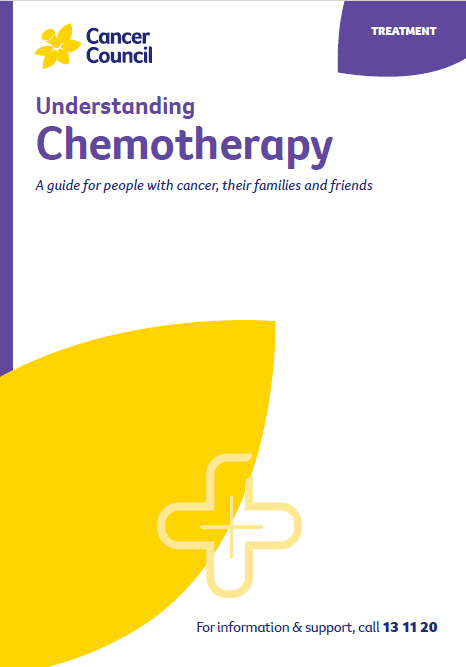- Home
- Lung cancer
- Treatment
- Chemotherapy
Chemotherapy for lung cancer
Chemotherapy is the use of drugs to kill cancer cells or slow their growth.
Learn more about:
- When is chemotherapy used?
- Having chemotherapy
- Side effects of chemotherapy
- What are drug therapies?
- Video: What is chemotherapy?
- Podcast: Making Treatment Decisions
When is chemotherapy used?
Chemotherapy can be used at different times:
- before surgery to try to shrink the cancer and make it easier to remove (neoadjuvant chemotherapy)
- before, or in combination with, radiation therapy to make radiation therapy more effective (chemoradiation); or in combination with immunotherapy
- after surgery to reduce the risk of the cancer returning (adjuvant chemotherapy)
- when cancer is advanced – to reduce symptoms and improve quality of life (palliative chemotherapy).
Having chemotherapy
Chemotherapy given to treat lung cancer is usually one, two or three drugs together or one by itself. Drugs are commonly given as a period of treatment followed by a break to allow your body to recover. This is called a cycle. The number of cycles will depend on the type of lung cancer and any side effects you have.
Side effects of chemotherapy
Chemotherapy works on cells that are dividing rapidly. Cancer cells divide rapidly, as do some healthy cells such as the cells in your blood, mouth, digestive system and hair follicles.
Side effects occur when these normal cells are damaged. As the body constantly makes new cells, most side effects are temporary. Some side effects are listed below.
| Anaemia | A low red blood cell count is called anaemia. This can make you feel tired, breathless or dizzy. Your treatment team will monitor your red blood cell levels and suggest treatment if necessary. |
| Risk of infections | Chemotherapy drugs can lower the number of white blood cells that fight infections caused by bacteria. If you get an infection caused by a virus, such as a cold, flu or COVID-19, the risk of getting a bacterial infection is further increased. Talk to your doctor about being vaccinated against flu and COVID-19. Good hand and mouth hygiene and social distancing are also important measures to reduce the risk of infection. If you feel unwell or have a temperature above 38°C, call your doctor immediately or go to the hospital emergency department. |
| Mouth ulcers | Some chemotherapy drugs cause mouth sores, ulcers and thickened saliva, which make it difficult to swallow. Your treatment team will explain how to take care of your mouth. |
| Hair loss | You may lose hair from your head and chest, depending on the chemotherapy drugs you receive. The hair will grow back after treatment is completed, but the colour and texture may change. |
| Nausea, vomiting or constipation | You will usually be prescribed anti-nausea medicine with your chemotherapy drugs, but some people still feel sick (nauseous) or vomit. Constipation is also a common side effect of some types of anti-nausea medicines. Let your treatment team know if you have these side effects, as they may be able to give you additional medicines. |
Learn more about chemotherapy, mouth health and hair loss, and listen to our podcast on Appetite Loss and Nausea.
What are drug therapies?
Sometimes called systemic therapies, drug therapies can travel throughout the body to treat cancer cells wherever they may be. This can be helpful for cancer that has spread (metastatic cancer). The main types of drug therapies used to treat lung cancer are chemotherapy, immunotherapy and targeted therapy.
Having drug therapies – Some drug therapies are given through a vein (intravenously). You will probably have drug therapies as an outpatient, which means you go to a treatment centre, but not stay overnight. Some types of targeted therapy come as tablets and can be taken by mouth (orally) at home.
→ READ MORE: Immunotherapy for lung cancer
Video: What is chemotherapy?
Watch this short video to learn more about chemotherapy.
Podcast: Making Treatment Decisions
Listen to more of our podcast for people affected by cancer
Dr Malinda Itchins, Thoracic Medical Oncologist, Royal North Shore Hospital and Chris O’Brien Lifehouse, NSW; Dr Cynleen Kai, Radiation Oncologist, GenesisCare, VIC; Dr Naveed Alam, Thoracic Surgeon, St Vincent’s Hospital, Epworth Richmond, and Monash Medical Centre, VIC; Helen Benny, Consumer; Dr Rachael Dodd, Senior Research Fellow, The Daffodil Centre, NSW; Kim Greco, Specialist Lung Cancer Nurse Consultant, Flinders Medical Centre, SA; Caitriona Nienaber, 13 11 20 Consultant, Cancer Council WA; Marco Salvador, Consumer; Janene Shelton, Lung Foundation Australia – Specialist Lung Cancer Nurse, Darling Downs Health, QLD; Prof Emily Stone, Respiratory Physician, Department of Thoracic Medicine and Lung Transplantation, St Vincent’s Hospital Sydney, NSW; A/Prof Marianne Weber, Stream Lead, Lung Cancer Policy and Evaluation, The Daffodil Centre, NSW.
View the Cancer Council NSW editorial policy.
View all publications or call 13 11 20 for free printed copies.
